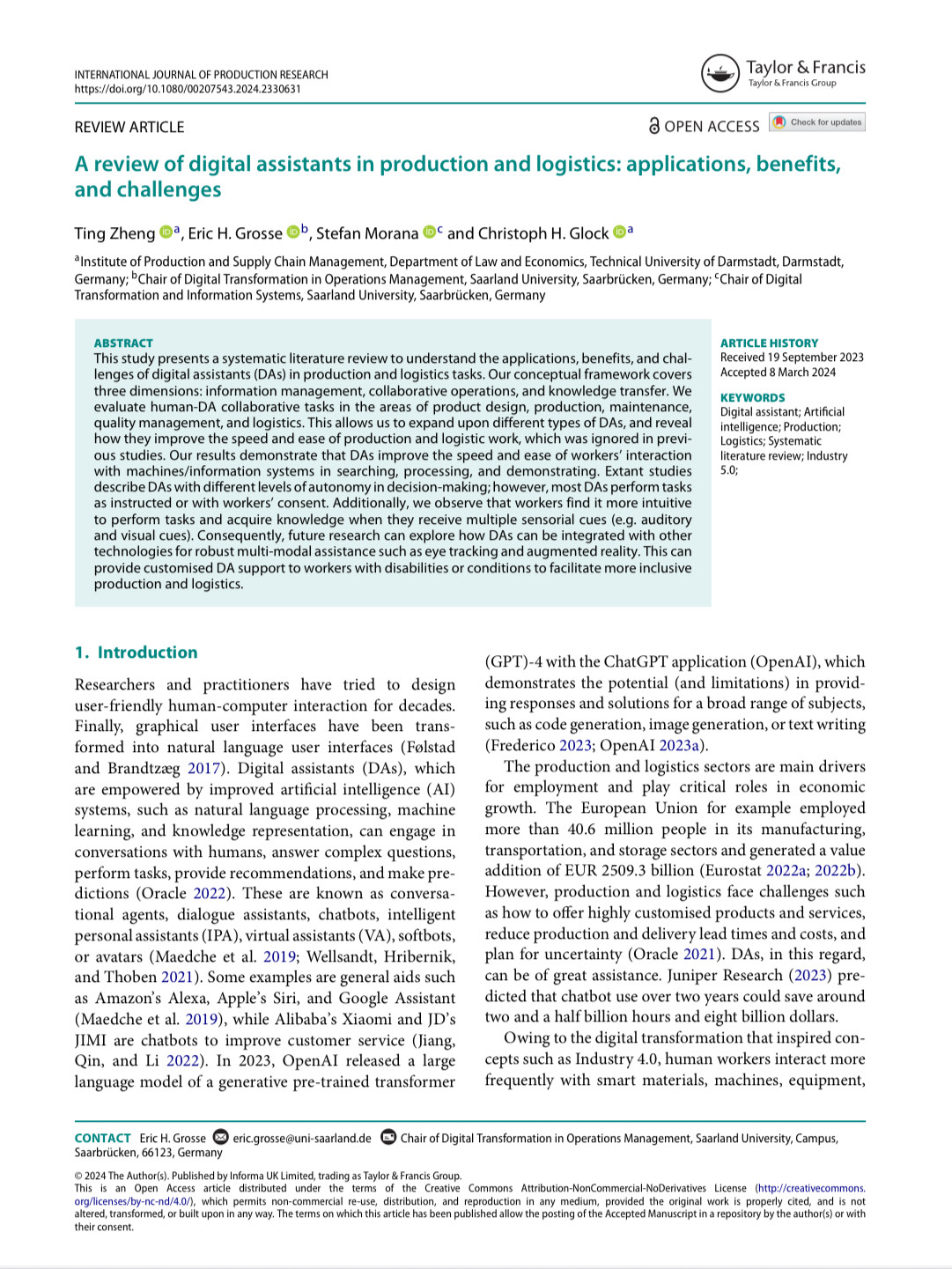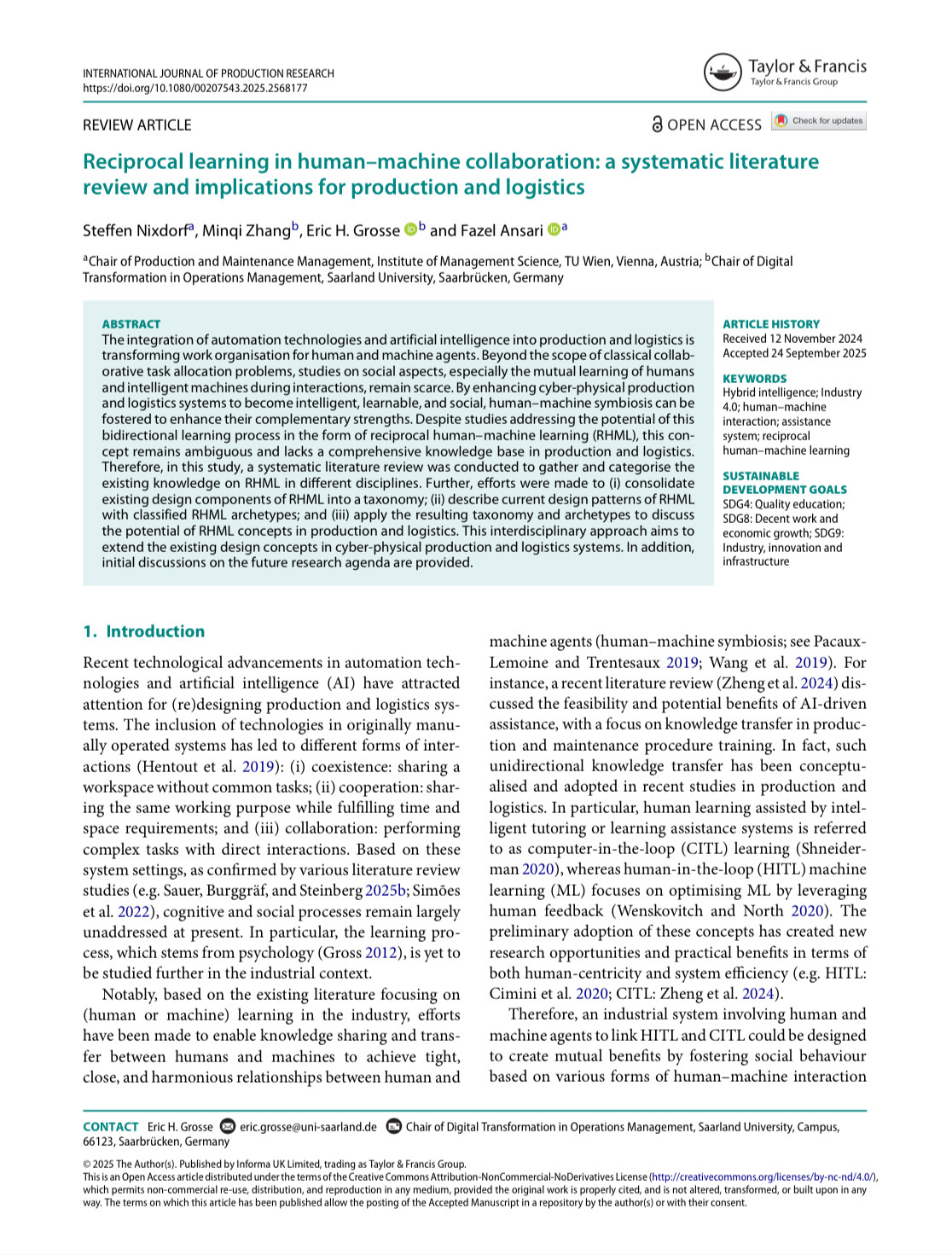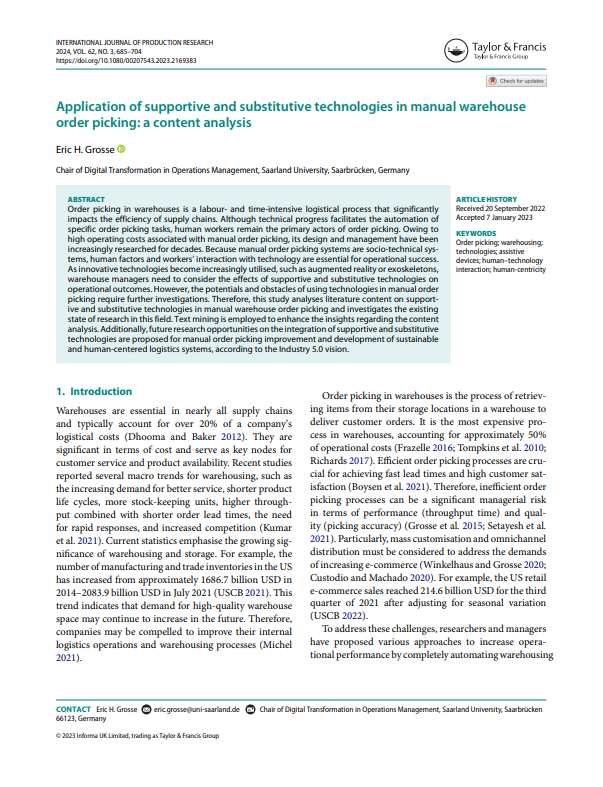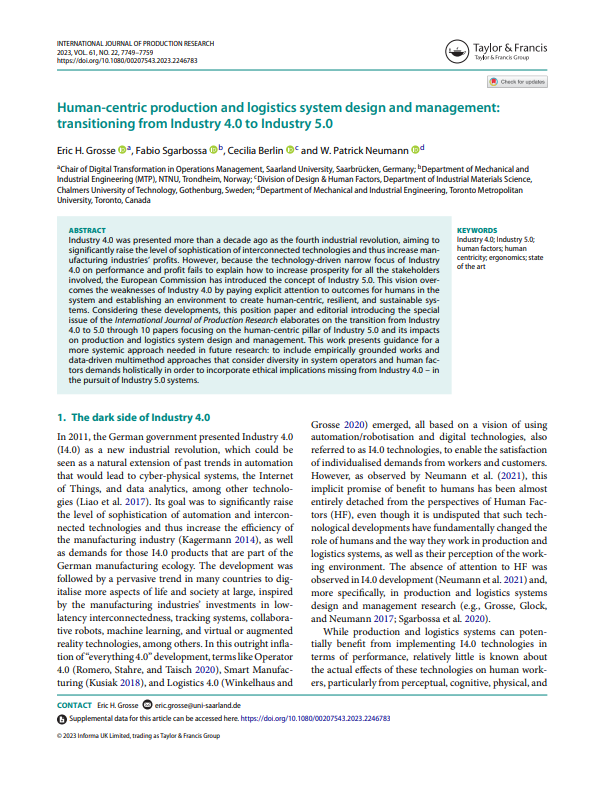Human-centric production and logistics system design and management: transitioning from Industry 4.0 to 5.0
Kurzbeschreibung
This special issue in the International Journal of Production Research (Impact Factor 2020: 8.568) aims to further the Industry 5.0 agenda with a focus on human-centred design and human factors aspects. We draw on the technological potentials of Industry 4.0 while adopting the human-centred goals of Industry 5.0 for increased sustainability of these systems for employees. To this end, the special issue will publish innovative approaches for the integration of human factors in production and logistics system design and management to create highly sustainable, human-centric and resilient work systems that use sophisticated technology to contribute to human prosperity.
Publikationen

A review of digital assistants in production and logistics: applications, benefits, and challenges
Zheng, Grosse, Morana & Glock (2025)
This study presents a systematic literature review to understand the applications, benefits, and challenges of digital assistants (DAs) in production and logistics tasks. Our conceptual framework covers three dimensions: information management, collaborative operations, and knowledge transfer. We evaluate human-DA collaborative tasks in the areas of product design, production, maintenance, quality management, and logistics. This allows us to expand upon different types of DAs, and reveal how they improve the speed and ease of production and logistic work, which was ignored in previous studies. Our results demonstrate that DAs improve the speed and ease of workers’ interaction with machines/information systems in searching, processing, and demonstrating. Extant studies describe DAs with different levels of autonomy in decision-making; however, most DAs perform tasks as instructed or with workers’ consent. Additionally, we observe that workers find it more intuitive to perform tasks and acquire knowledge when they receive multiple sensorial cues (e.g. auditory and visual cues). Consequently, future research can explore how DAs can be integrated with other technologies for robust multi-modal assistance such as eye tracking and augmented reality. This can provide customised DA support to workers with disabilities or conditions to facilitate more inclusive production and logistics.

Reciprocal learning in human–machine collaboration: a systematic literature review and implications for production and logistics
Nixdorfa, Zhangb, Grosse and Ansari (2025)
The integration of automation technologies and artificial intelligence into production and logistics is transforming work organisation for human and machine agents. Beyond the scope of classical collaborative task allocation problems, studies on social aspects, especially the mutual learning of humans and intelligent machines during interactions, remain scarce. By enhancing cyber-physical production and logistics systems to become intelligent, learnable, and social, human–machine symbiosis can be fostered to enhance their complementary strengths. Despite studies addressing the potential of this bidirectional learning process in the form of reciprocal human–machine learning (RHML), this concept remains ambiguous and lacks a comprehensive knowledge base in production and logistics. Therefore, in this study, a systematic literature review was conducted to gather and categorise the existing knowledge on RHML in different disciplines. Further, efforts were made to (i) consolidate existing design components of RHML into a taxonomy; (ii) describe current design patterns of RHML with classified RHML archetypes; and (iii) apply the resulting taxonomy and archetypes to discuss the potential of RHML concepts in production and logistics. This interdisciplinary approach aims to extend the existing design concepts in cyber-physical production and logistics systems. In addition, initial discussions on the future research agenda are provided.

Application of supportive and substitutive technologies in manual warehouse order picking: a content analysis
Grosse (2024)
Order picking in warehouses is a labour- and time-intensive logistical process that significantly impacts the efficiency of supply chains. Although technical progress facilitates the automation of specific order picking tasks, human workers remain the primary actors of order picking. Owing to high operating costs associated with manual order picking, its design and management have been increasingly researched for decades. Because manual order picking systems are socio-technical systems, human factors and workers’ interaction with technology are essential for operational success. As innovative technologies become increasingly utilised, such as augmented reality or exoskeletons, warehouse managers need to consider the effects of supportive and substitutive technologies on operational outcomes. However, the potentials and obstacles of using technologies in manual order picking require further investigations. Therefore, this study analyses literature content on supportive and substitutive technologies in manual warehouse order picking and investigates the existing state of research in this field. Text mining is employed to enhance the insights regarding the content analysis. Additionally, future research opportunities on the integration of supportive and substitutive technologies are proposed for manual order picking improvement and development of sustainable and human-centered logistics systems, according to the Industry 5.0 vision.

Human-centric production and logistics system design and management: transitioning from Industry 4.0 to Industry 5.0
Grosse, Sgarbossa, Berlin & Neumann (2023)
Industry 4.0 was presented more than a decade ago as the fourth industrial revolution, aiming to significantly raise the level of sophistication of interconnected technologies and thus increase manufacturing industries’ profits. However, because the technology-driven narrow focus of Industry 4.0 on performance and profit fails to explain how to increase prosperity for all the stakeholders involved, the European Commission has introduced the concept of Industry 5.0. This vision overcomes the weaknesses of Industry 4.0 by paying explicit attention to outcomes for humans in the system and establishing an environment to create human-centric, resilient, and sustainable systems. Considering these developments, this position paper and editorial introducing the special issue of the International Journal of Production Research elaborates on the transition from Industry 4.0 to 5.0 through 10 papers focusing on the human-centric pillar of Industry 5.0 and its impacts on production and logistics system design and management. This work presents guidance for a more systemic approach needed in future research: to include empirically grounded works and data-driven multimethod approaches that consider diversity in system operators and human factors demands holistically in order to incorporate ethical implications missing from Industry 4.0 – in the pursuit of Industry 5.0 systems.
A Systems Framework and Approach for Analyzing Human Factors Interactions in Innovation and Industry 4.0 & 5.0
Neumann, Winkelhaus, Grosse & Glock (2021)
21st Triennial Congress of the International Ergonomics Association
We apply “Systems Thinking” and Human Factors principles to develop a versatile approach to considering Human Factors in innovation projects like Industry 4.0 or Industry 5.0.
Industry 4.0 and the Human Factor – A Systems Framework and Analysis Methodology for Successful Development
Glock, Grosse, Elbert & Franzke (2017)
International Journal of Production Economics
The fourth industrial revolution we currently witness changes the role of humans in operations systems. Although automation and assistance technologies are becoming more prevalent in production and logistics, there is consensus that humans will remain an essential part of operations systems. Nevertheless, human factors are still underrepresented in this research stream resulting in an important research and application gap. This article first exposes this gap by presenting the results of a focused content analysis of earlier research on Industry 4.0. To contribute to closing this gap, it then develops a conceptual framework that integrates several key concepts from the human factors engineering discipline that are important in the context of Industry 4.0 and that should thus be considered in future research in this area. The framework can be used in research and development to systematically consider human factors in Industry 4.0 designs and implementations. This enables the analysis of changing demands for humans in Industry 4.0 environments and contributes towards a successful digital transformation that avoid the pitfalls of innovation performed without attention to human factors. The paper concludes with highlighting future research directions on human factors in Industry 4.0 as well as managerial implications for successful applications in practice.

